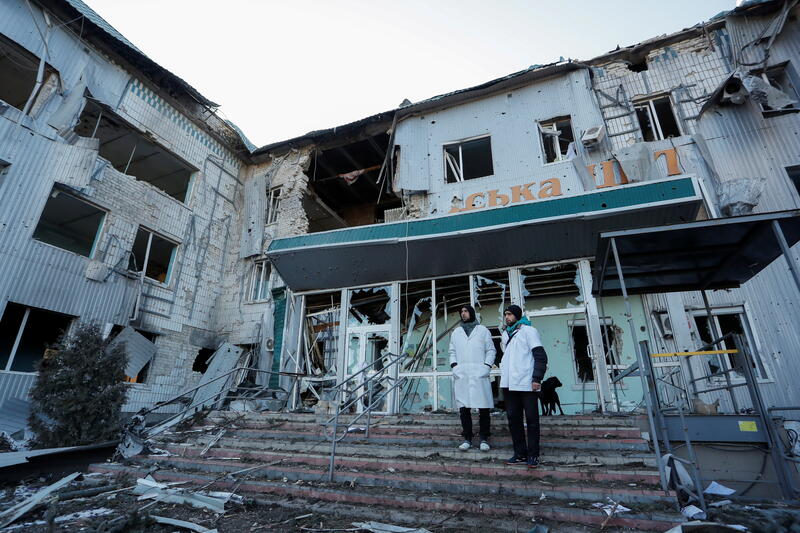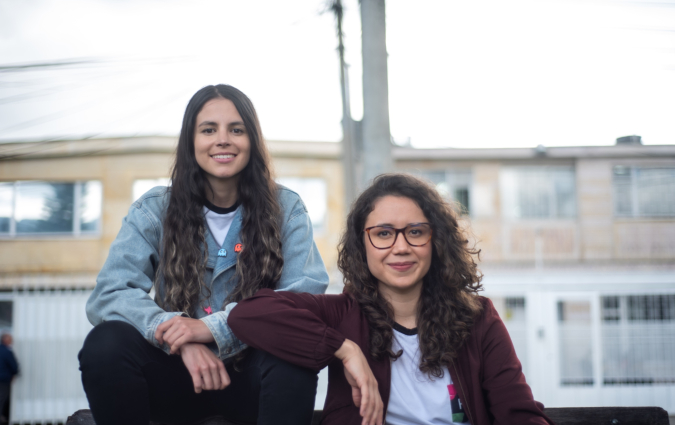Reporting on human rights amid the war in Ukraine: what journalists need to know

A local hospital destroyed in the Donetsk region. REUTERS/Alexander Ermochenko
Andrew Stroehlein is a journalist, communications professional, and human-rights activist based in Brussels. He is the European media director of Human Rights Watch and has previously worked as director of communications at the International Crisis Group. Andrew also has extensive experience of writing about conflict, authoritarianism, and the role of the media in such environments.
The war in Ukraine presents numerous human rights issues, such as war crimes against civilians, issues with the treatment of prisoners of war and the repression of free speech and of the media in Russia. For journalists covering the conflict, it’s crucial to recognise these issues, and to create coverage that does not dehumanise anyone involved. In this interview, Andrew outlines best practices and mistakes to avoid when reporting on these issues. The interview has been edited for length and clarity.
Q. Human Rights Watch recently posted a piece outlining how it verified that a hospital in Vuhledar, in the Ukrainian Donetska region, was hit by a Russian cluster munition. Due to their indiscriminate effect, cluster munitions are banned by a UN convention not adopted by Russia or Ukraine. Can you outline your verification process for possible human rights breaches like this one?
A. We don't respond to every report immediately. What we do is look into a variety of information sources. So on the one hand, you have information sources that would be on the ground. Ideally, we have people on the ground. In some cases, we don't. So what we're doing is open source verification using images and videos that we're getting from the ground and trying to piece things together, as other organisations are doing. We also combine that with interviews with people on the ground. We try to piece things together that way so we can put together a timeline of events and what was happening immediately before an attack.
It takes days, sometimes even weeks, to piece these things together. And sometimes we get to a point where we don't have enough information and we can't publish anything conclusive, so we don't publish. We either wait for new information or that investigation is on hold while we go and look at new abuses. The problem is there are so many abuses on the ground right now. Unfortunately, there are too many to choose from. If we can't get forward on one investigation, we can easily find 10 more to look into.
Q. Russia is spreading disinformation through formal channels and social media, denying human rights breaches are taking place. Should journalists engage with these claims?
A. There's two levels. First of all, let's just look at the information that is flying around on Twitter and other social media platforms. I think that's one level where people need to be much more cautious than they are, not further any piece of information, whether it comes from Source A or Source B, until there's a recognised authority and experienced voice actually looking at these things. [People shouldn't] jump the gun and then say, “This has happened, I'm gonna tweet this first.” There's no benefit to that. It usually benefits the propagation of lies and propaganda.
When it comes to journalists specifically, many will feel that, to offer some kind of balance, they have to say, “On the one hand, there are all these experts that say this, but on the other hand, the government denies it.” I guess that's showing a kind of balance to journalism. But a better journalist would say, “It is.” Or that old saying, “The journalist's job is not to quote people who say that it's raining, or other people who say it's not raining, it's to look out the window.”
Q. You recently posted a Twitter thread about how humiliating prisoners of war breaches the international rules of war. Can you give a brief explanation?
A. The Geneva conventions say a state or a military is not to display prisoners of war, to degrade them. It's not just about the protection of those prisoners of war. It's about protecting their families back home. If people are seen to have been captured, their families can come under pressure, can get into trouble, can be arrested. Who knows what's going to happen?
It's key to remember that the conventions apply to states. But we can be more sensitive to that. And journalists can be more sensitive to this, even though the rules don't exactly apply to them. Anybody who has some power to share material, whether you're a big media outlet, or just somebody with 10 followers on Twitter, you have some responsibility to think about these things and think twice before you tweet.
Q. Are there any other wartime rules you think people should be more aware of?
A. We have to look much more carefully at what these laws of war are. The basic foundation is that laws apply whether you're the invading army and the occupier, or the country that has been invaded. These laws apply, and you're supposed to distinguish between civilians and military targets. A military attack on a purely military target is not a war crime. When there are civilians there and you have not distinguished between civilians, or when you have made such a wide area attack that you can't distinguish between civilians, or when you're leaving little bomblets like cluster bombs that will be there for a long time, or of course when you're deliberately targeting civilians, all those should be looked into as war crimes.
Q. Are there any less obvious human rights issues related to the war in Ukraine that you think journalists should cover more?
A. The biggest and most obvious example is the situation in Russia, where we witnessed the complete collapse of human rights through these mass arrests of people. It just takes on these absurd levels when somebody holds a sign that literally has nothing on, a blank piece of paper, and they get arrested for that. It's absurd in the extreme, but it's also vicious. We have documented torture in police custody of protesters, and then the extreme censorship on top of the crackdown on independent reporting, the crackdown on criticism in the news media. That is a spin off, if you will, from this war in Ukraine. I honestly don't think it's getting the attention that it deserves right now.
Q. How is Human Rights Watch addressing the crackdown on freedom of the press in Russia?
A. We've published twice on the mass arrests, the massive sweeping crackdown on media, this new wave of really extreme censorship. So we've reported on that. On the one hand, the Kremlin is trying to block access to free information. And it's hard to control, not just the narrative, but really control the information space inside of Russia. And so they’re limiting and blocking access to some independent sources, they are doing that increasingly and with extreme penalties for people who even just say it's a war, which it is, or say it's an invasion, which it is.
Arrests have gone into overdrive. But at the same time, we're seeing international companies focusing on seeing what they can do to help. And we're starting to question whether some of the decisions are right, because if these decisions that outside tech companies are making further isolate ordinary Russians, then who does that help, exactly? The Kremlin is trying to isolate ordinary Russian citizens from the truth. The outside world shouldn't be doing the same thing.
Q. Around three million refugees have already fled Ukraine and that number will likely grow. What can journalists do to ensure they cover this refugee crisis in a humane way that respects the refugees’ rights?
A. We've got to be really careful, particularly with things like photos of children. And there are always issues of covering refugees where they use images to push a narrative of people that is, in some ways, dehumanising. This is something photojournalists who work in war zones and outside war zones grapple with all the time. What do you show? Is there a limit to what you don't show in terms of the suffering? Or should people everywhere around the world see that suffering? Because that's the reality on the ground, and I don't think those are easy questions, and they always come up and I don't think there's ever going to be a simple answer.
Q. Western media outlets have shown a keen focus on the war, with daily front pages dedicated to it. How have you found this compared to attention given to other humanitarian crises around the world?
A. With every war or massive invasion, you get a huge boost in attention at the very beginning. Now, this has been going on for eight years, and eight years back the attention was around it was huge. Then it sort of petered out until there were troop movements on the border. So I think that's, unfortunately, the natural cycle of international media. This is very huge now. We'll find something else happening in the world at some point, unless it keeps escalating.
There is something to be said for the idea that a lot of European media are giving Ukraine more attention than they gave to Ethiopia, for example, to the crisis in Tigray. On the one hand, you can understand why. First of all, you have one UN member invading another UN member, which is a different type of conflict than internal civil war. But for Europeans, it's also next door. And it's understandable that you would have the media more interested in a horrific crisis next door, than a horrific crisis farther away. That's normal to an extent.
But Western media generally have on occasion just slipped to some really blatant racism. It's the idea that, “Now, this conflict is important, and these people dying are important, because they look like us.” And obviously the attitude that looks at things that way is just extremely troubling, but also revealing to how a lot of the world has been covering a lot of events for a long time. There has been an inherent racist bend to international reporting in terms of the things that get covered. And it goes completely against what our organisation tries to do. We have a universalist approach to humanity.
Q. How can journalists ensure they keep up their coverage of other ongoing humanitarian issues such as the pandemic?
A. We are losing media interest in the pandemic for a number of reasons. First of all, you had the Omicron wave slowing down, you had the lifting of a lot of restrictions in places. And you had the idea that oh, well, vaccinations are going relatively fine here. This is the product of a deeply anti-universalist or just absolutely racist approach to policy and to reporting, because three billion people still haven't had one shot yet.
And why haven't they had one shot yet? Because of the vaccine shortage that's caused by the European Union, and Britain and Switzerland, literally blocking wider vaccine production at the World Trade Organisation, an absolutely enormous story, the absolute biggest scandal of recent years. And yet, the coverage of it is pretty minimal. But you know, the media doesn't care so much about them because they're in Africa, or other places that Western media has traditionally not cared too much about.
In every email we send you'll find original reporting, evidence-based insights, online seminars and readings curated from 100s of sources - all in 5 minutes.
- Twice a week
- More than 20,000 people receive it
- Unsubscribe any time







